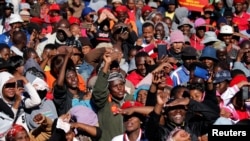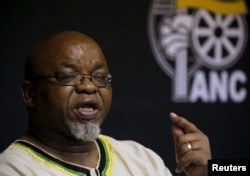Bongani Skhosana ran a business driving children to school in South Africa’s rural Umuziwabantu Municipality. The 40-year-old father of three was also running for local office as a candidate from the ruling African National Congress.
But just weeks ahead of that vote, gunmen opened fire on his school bus, killing him in full view of the children.
His death was one of at least 12 killings of political candidates and activists as the nation prepares for August 3 municipal elections. Several victims were killed recently enough that their names will still appear on ballot papers.
Like Skhosana, many of the victims were members of the ruling ANC. Their deaths are a worrying sign as elections draw near in Africa’s most mature democracy.
Discontent within ANC ranks
Violence has marred this municipal election in other ways, too. In June, residents of the ANC-dominated Atteridgeville township, near Pretoria, demonstrated against their own party. Protesters said they were upset that ANC leadership appointed a mayoral candidate who is from another province instead of the local candidate they preferred. So they torched vehicles and tires, looted shops and hurled rocks at passing motorists.
But violence has never been far from the polls, says political analyst Aubrey Matshiqi. He says while this violence is regrettable, the nation’s most triumphant election — which marked its transition from apartheid to democracy — was not without bloodshed.
“Sometimes we forget that two days before the 1994 elections, there were bombs exploding in some parts of the country,” he told VOA in Johannesburg. “So if you put the matter in perspective, the problem of political violence has not been as deep as was the case prior to the 1994 elections. That’s notwithstanding one death is one death too many. So at the level of the country, I don’t think we have reached crisis levels yet.”
The ANC has said the motives of the killings are unknown, and while investigations are ongoing, few arrests have been made. But the party’s stance on violence is clear, said spokeswoman Khusela Sangoni.
“We condemn in the strongest possible terms any incidences of violence which have unfortunately sought to characterize this election,” she told VOA. “As the ANC, we have called up on the law enforcement agencies to act with no fear or favor to bring perpetrators of these incidences to book.”
The ANC has won every national election in South Africa since it first came to power in 1994. But recent polls indicate the ANC may lose major urban areas, including economic hub Johannesburg and the capital, Pretoria. The opposition Democratic Alliance has held the city of Cape Town for about a decade now.
Economic issues
Matshiqi says the same element is driving both the violence and the ANC’s slipping popularity — the economy. South Africa’s unemployment rate is staggering, at more than 26 percent.
“In some of the provinces in this country, the only way in which one can become a member of the middle class — or even get a job for that matter — is through finding his name on an ANC election list,” he said. “And through him or her being elected as a councilor during this election. So what that means is that unemployment has become one of the main drivers of some of the violence we are seeing today.”
And violence, it seems, is contagious. A new report from the Institute for Justice and Reconciliation found this week that a quarter of South Africa’s more than 26 million eligible voters are willing to resort to violence to achieve political ends.
The violence has even attracted the attention of the clergy, with the head of the Justice and Peace Commission for the Southern African Catholic Bishops’ Conference calling for calm.
The killings, said Bishop Abel Gabuza, are “one of the biggest threats to South Africa’s hard-won democracy.”
“We should make sure that we do not develop into a country where assassinations of candidates before elections are considered normal,” he said. “Given the sacredness of human life, even a death of one candidate during an election should be considered as one too many.”





